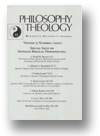|
1.
|
Philosophy and Theology:
Volume >
13 >
Issue: 1
Heidi M. Ravven
The Garden of Eden:
Spinoza’s Maimonidean Account of the Genealogy of Morals and the Origin of Society
abstract |
view |
rights & permissions
| cited by
Spinoza uses the interpretation of Adam’s disobedience in the Garden of Eden to mount a biblical defense of the life devoted to intellectual pursuits. In his philosophic rereading of the biblical story, Spinoza follows the lead of Maimonides in the Guide to the Perplexed Part I, chapter 2. Both philosophers invoked the biblical text to lend authority to the view that moral consciousness, in contrast with the intellectual, marks a decline in the human condition. This paper explores Spinoza’s dependence on the Maimonidean interpretation and also shows where Spinoza parts company with it, giving his own philosophical twist to the tale.
|
|
|
2.
|
Philosophy and Theology:
Volume >
13 >
Issue: 1
Michael A. Rosenthal
Spinoza’s Dogmas of the Universal Faith and the Problem of Religion
abstract |
view |
rights & permissions
| cited by
I argue that in the seven “dogmas of the universal faith,” which are introduced in chapter XIV of the Theological-Political Treatise, Spinoza reinterprets the traditional view of a minimal credo required for salvation. The dogmas are dialectical propositions that are true insofar as they are practically useful. Instead of obtaining salvation for the soul, the dogmas aid in the preservation of the body, particularly through the regulation of religion within the state. I show that reading the dogmas in light of Spinoza’s method of interpreting Scripture is crucial to the understanding of their function in religion. In conclusion, I claim that the dogmas do not lead to the abolition of traditional religion, as some have claimed, but rather support the toleration of diverse religious practices.
|
|
|
4.
|
Philosophy and Theology:
Volume >
13 >
Issue: 1
Nancy Levene
Spinoza’s Bible:
Concerning How It Is That “Scripture, insofar as it contains the word of God, has come down to us uncorrupted”
abstract |
view |
rights & permissions
| cited by
My essay explores the connections between Spinoza’s theory of biblical interpretation and his conception of prophecy, linking the two through what he calls “moral certainty.” The question of what prophecy conveys is connected to the question of how to read Scripture because readers are in a similar position to both the prophets, who attain sure knowledge of some matter revealed by God, and the audience of prophecy, who have access to this knowledge only through faith. Like prophets, readers are interpreters of something that can not be known by way of reason alone; hence the effort to secure certainty involves factors other than purely rational ones (the history of the text, for readers; a vivid imagination, signs, and virtue for the prophet). But like the prophet’s audience, the knowledge of texts that we can attain is not always “sure,” since texts “transcend” us in a certain sense. That is, they introduce novelties---laws, customs, histories---that we wouldn’t know without reading them, and we therefore have to take their authors, prophets in this case, at their word-as it were, on faith. While most of the focus on Spinoza’s concept of biblical interpretation has centered on his maxim that “the method of interpreting Scripture is no different from the method of interpreting Nature,” I hold that it is just as crucial to investigate his claims concerning the nature of prophecy, and in particular to allow prophetic knowledge to shed light on Spinoza’s concepts of words, history, and the corruption and incorruptibility of texts.
|
|
|
5.
|
Philosophy and Theology:
Volume >
13 >
Issue: 1
Adrian Bardon
Leibniz on the Epistemic Status of the Mysteries
abstract |
view |
rights & permissions
| cited by
In this paper, I examine Leibniz’s account of the epistemic status of the Christian Mysteries in his “Preliminary Dissertation on the Conformity of Faith with Reason.” In it, the Mysteries are held to be true, yet also to be beyond human comprehension. This conjunction gives rise to a dilemma: how can the Mysteries bemeaningfully asserted if they are unintelligible? To answer this, Leibniz compares them to natural truths, which are demonstrable by God alone. To complicate matters, however, he suggests that certain Mysteries have the status of truths of logic, or of mathematics; this raises a special problem in understanding his view of the epistemic status of such Mysteries for us. I offer a suggestion as to how he may have wanted us to think of the relationship between these Mysteries and our faculty of comprehension. I then employ my conclusions in explaining Leibniz’s answer to Bayle’s skepticism regarding the Mysteries, as well as in explaining his answer to the question as to how belief in the Mysteries can be rationally justified.
|
|





